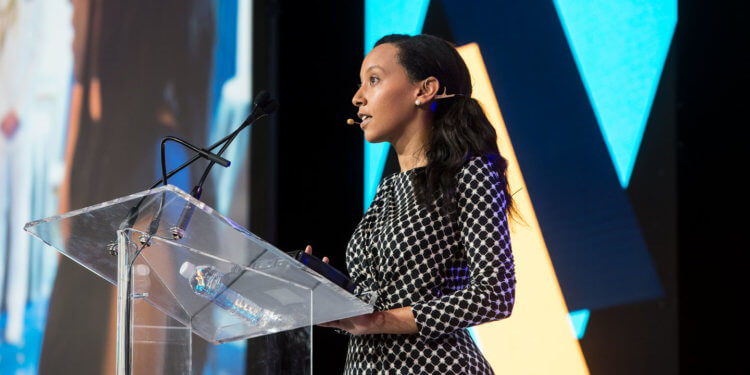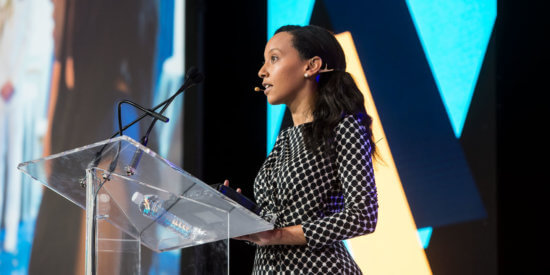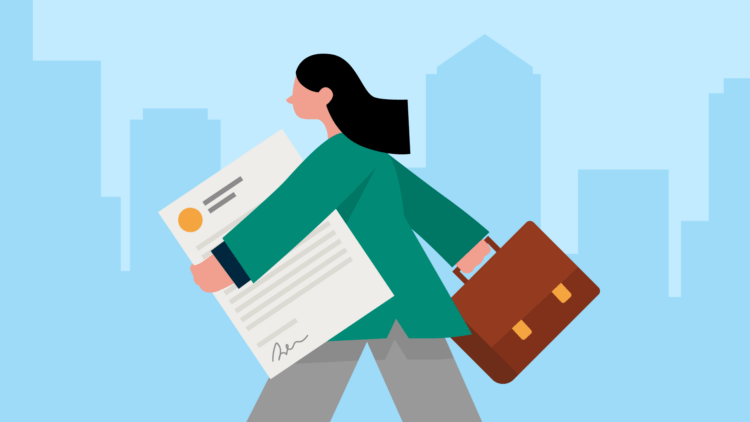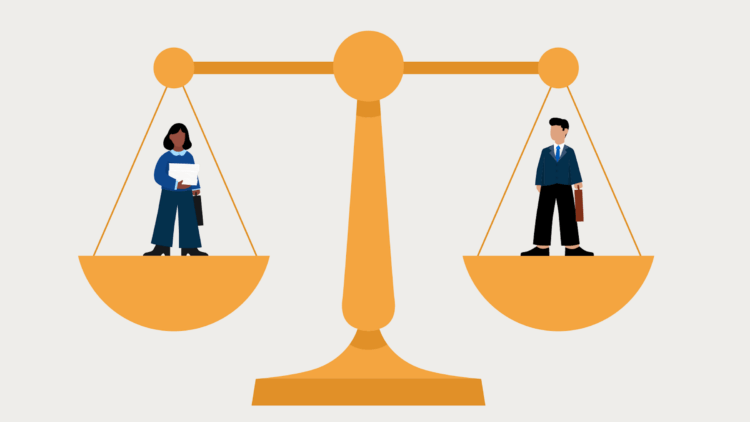Haben Girma is an advocate for equal opportunities for people with disabilities. The first Deafblind student to graduate from Harvard Law School, Haben was a successful litigator before she switched exclusively to education and advocacy in 2016.
For many, Haben’s wit, charm, and public speaking ability have turned their perceptions of people with disabilities upside down, and have energized people with and without disabilities to work together to create a more inclusive world—but there’s still plenty of work to do.
Separate is never equal. Disability is not a barrier, but accessibility can be. In fact, differences drive innovation, and with a bit of thoughtfulness and creativity, it’s entirely possible to make the world accessible for everyone. These are just a few of the key points that Haben covered in her keynote speech at this year’s Clio Cloud Conference.
We were lucky enough to sit down with Haben to hear some of her additional thoughts on accessibility.
Here are a few key takeaways from our interview and her talk:
Embrace and celebrate differences—they drive innovation
One of the points Haben mentioned in her talk was that in the workplace and beyond, “diverse teams are stronger teams.” Many technologies have been created or inspired by people with disabilities—and many of them benefit everyone, not just people with disabilities.
For example, Haben told the story of how two friends—one sighted, one blind—invented one of the earliest versions of the typewriter in Italy in 1808.
“If a blind person in 1808 wanted to send a letter, they’d voice their letter and someone else would write it down. But these two friends had to keep their letters private—they were love letters,” she explained.
“They used that challenge as an opportunity to innovate, and they developed the first working typewriter. When you type, you’re using touch, and it’s a way to develop print—to write a letter without using your eyes. That was incredibly innovative back in 1808. Nowadays, lots of people use keyboards and some of the fastest typists are touch typists.”
As another example, Vinton Cerf—the father of the internet, and the man who invented the protocol that made possible Wi-Fi, Ethernet, LANs, the World Wide Web, e-mail and more—is hard of hearing.
Deaf individuals, unable to hear spoken languages, created visual languages—and these sign languages can also be learned and used by anyone. Deafblind individuals, also innovative, developed tactile sign language. So an individual who is blind can put their hand over another person’s hand and feel the signs.
“There are lots of different ways to connect with people,” Haben said.
By creating solutions that make the world more inclusive, we give everyone a platform to share their ideas for making the world better. In fact, if Haben could go back in time, she said that she would have started celebrating her differences earlier.
I was afraid to be different and stand out when I was in middle school, because in middle school everyone wants to be cool and normal. But normal is boring. And later, I realized it’s better to be different and stand out. Own the ways you are different and celebrate them.
When it comes to technology, consider accessibility from the start
For Haben, one of the most rewarding parts of advocating for inclusivity is seeing barriers removed. During her talk, she told the story of how she fought for her right to accessible menus at her college cafeteria, and when a blind student attended the same school the next year, they didn’t have to fight for access because of her previous efforts.
However, she says that one of the biggest challenges to bringing down barriers is when people leave accessibility to the end when designing and building products and apps. “When you do it that way, accessibility becomes more difficult, more costly, and more time consuming,” she said. “It’s better to plan for accessibility from the start, before you even build the product.”
For example, imagine building a skyscraper without first planning for accessibility. You’d have to tear down large parts of the building to add an elevator at a later time. “That’s more costly and time consuming than planning for an elevator from the start and designing the building and building it with an elevator in mind,” she said.
This is an important consideration as more and more new technology comes online. When we have self-driving cars, will they be accessible for people who are deaf and/or blind? What about people who use wheelchairs, or people with limited mobility? All of these considerations need to be made from the start.
You may like these posts
Know that separate is never equal
Haben believes that technology for people with disabilities has a lot of potential.
“I’d love to see it explore haptics, the communication of information through touch,” she said. “For example the Apple Watch has haptic technology—it taps and vibrates. I’ve also heard of a special vest that provides tactile information. So there are already some companies exploring this, but I’d love to see more.”
That said, Haben is most focused on advocating to make mainstream technology accessible to all. “I’m not a fan of separate technology, because separate is never equal,” she explained. “I’d love to have a future where all websites, all apps, all services were accessible to everyone.”
For example, Haben spoke during her presentation about how, while in China, she used a camera app to send a photo of a strange object to a friend to help her discover what it was (it was a dragonfruit).
“A lot of people think a camera app wouldn’t need to be accessible to blind people, because blind people never take pictures,” she said. “Try not to assume what people with disabilities can or can’t do. We’ll find new ways to use services once they become accessible.”
Don’t be afraid of the unknown
Haben pointed out that when you’re Deafblind, the whole world is unknown. That means she’s constantly exploring.
“Don’t be afraid of the unknown. Embrace the unknown,” she said. “There are always opportunities for you to explore and learn more, and when you’re thoughtful and creative and continue exploring, you’ll create new opportunities.”
Sometimes, the unknown can come in the form of a challenge for which there is no roadmap, and no immediate, obvious solution. For those facing challenges—whether as an advocate for equal opportunities for people with disabilities, or in the form of something else—Haben had some additional advice:
We all need to be pioneers sometimes, and that means going forward through the challenges. If you’re thoughtful and creative, you’ll find solutions. Sometimes you need to recruit allies. Mentors are also really helpful. Find people who’ve gone through similar situations and get their advice.
For those who might be curious, two of Haben’s mentors are Lainey Feingold and Daniel Goldstein. “They’re both amazing disability rights lawyers,” she said.
Finally, Haben has pointed out that facing the unknown is also key for making connections. In this video, where she interacts with a man who is nervous about typing to her due to having dyslexia, Haben calms his fears, enjoys a bit of funny banter with him, and answers his question about how to connect with her if they see her on the street, without a keyboard.
“My philosophy is to try and connect with people in whatever form or manner is available to us,” she said. “If you don’t know, try … I don’t want people to feel pressured to do something the right way. Just try. It’s all about your intentions and your attitude rather than following some arbitrary rules.”
Disability is not a barrier—but decisions about inclusion can be
When Helen Keller was looking for a college to attend, Harvard University wouldn’t admit her. At the time she applied, Harvard was still an all-men’s school.
“Helen’s gender didn’t hold her back. Her disability didn’t hold her back. It was the community at Harvard that chose exclusion,” Haben said.
Inclusion is always a choice. When we choose exclusion, we shut the door on innovative ideas that could make the world a better place. When we choose inclusion, we open more space for thoughtful, creative discussions and solutions from which everyone can benefit.
“Disability is never the barrier. The barriers are society and the obstacles that people create, and it’s up to all of us to practice inclusion,” Haben said.
Indeed, Haben has been incredibly successful at both advocating for and practicing inclusion herself.
In college, she successfully got her school cafeteria to provide her with accessible menus so that she could make informed food choices. As a litigator, she worked on the case National Federation of the Blind vs. Scribd, in which the court found that the Americans with Disabilities Act (ADA) did in fact apply to services like Scribd, requiring the reading subscription provider to program its services to be accessible through screen reader software.
When interacting with others, she sticks to her philosophy of finding ways to connect in whatever manner is available to both people.
A few tips for lawyers looking to make their services more accessible:
- Have an accessible website. Make sure your website follows the Web Content Accessibility Guidelines.
- Include image descriptions. A short description for photos on your website and on social media can help make your content more accessible to people with limited vision.
- Include captions for videos. Captions are key for making any videos on your website accessible for people with limited hearing.
- Increase hiring of lawyers with disabilities. People with disabilities have a lot to offer. Hiring lawyers with disabilities opens up a broader talent pool for your law firm to pull from.
Choosing inclusion has a multiplier effect—the more often you choose it, the more you role-model it for others in your community, encouraging everyone to ask questions, work together, and create an inclusive world.
As a final note, Haben encouraged everyone at the conference to champion inclusion in their communities:
“Go back to your communities and look around for potential barriers,” she said, “and once you’ve identified barriers, work to remove those barriers.”
Haben’s incredible talk was just one of the amazing keynotes at the 2017 Clio Cloud Conference. Don’t miss the next round—register now to join us again in New Orleans in 2018.
About Haben
The first Deafblind person to graduate from Harvard Law School, Haben Girma advocates for equal opportunities for people with disabilities. President Obama named her a White House Champion of Change, and Forbes recognized her in Forbes 30 Under 30. Haben travels the world consulting and public speaking, teaching clients the benefits of fully accessible products and services. Haben is a talented storyteller who helps people frame difference as an asset. She resisted society’s low expectations, choosing to create her own pioneering story. Because of her disability rights advocacy she has been honored by President Obama, President Clinton, and many others. Haben is also writing a memoir that will be published by Grand Central Publishing in 2019.
Haben has been featured extensively in media around the world, including the BBC, NBC, Forbes, NPR, and many more. Learn more at habengirma.com and follow Haben on Twitter, Facebook, Instagram, and LinkedIn.
We published this blog post in October 2017. Last updated: .
Categorized in: Business









